— CHAPTER 25 —
COUNTDOWN
The plot against President Kennedy thickened in November. By now, Lee had convinced me that Kennedy was a great President who sought peace, and I shared Lee’s fear that his life would soon end. Lee had been recruited in the Baton Rouge meetings into the Dallas plot. He had penetrated the ring. Now, he was meeting with one or more of the plotters on a regular basis. “But I’m meeting too many new people,” he told me. He said he felt he was being “treated like a dangle.” He was given tasks to do, as if they trusted him, but he was never certain who was who.
A Secret Service agent sought his help in assessing the possible ambush sites that might be used when the President came to Dallas. Presumably, this was to afford protection for Kennedy, but of course, such work would also reveal which sites were best for murder.

One meeting in particular disturbed Lee: he called it the “trophy” meeting. It was held at the posh 3525 Turtle Creek address. Lee had not attended that meeting, but he’d been told about it. “Kennedy won’t be killed on Turtle Creek Boulevard,” Lee revealed, “because Mayor Cabell, Senator Tower, and Clint Murchison all have apartments right there, at 3525 Turtle Creek.”1 General Walker happened to live on Turtle Creek, too, Lee said, but farther away.
Lee said the motorcade would turn at the 3600 block “because the plotters want to show their power ... that they are in charge of their trophy.”2 They would also be taking trophy photos of the assassination. At this time, Lee believed the kill site would probably be the Dallas Trade Mart — if Kennedy wasn’t terminated earlier in Chicago or Miami. Sickening to me and Lee was their plan to circulate a photo of JFK’s head, “dead, with his eyes left open.”
Today, I wonder if Lee’s contacts were fake agents, going through the motions to properly position him for his role as patsy — a possibility never far from Lee’s mind since our showdown at Katzenjammer’s. Was Lee thus kept from interacting meaningfully in Dallas with persons who might have been able to save the president? Or worse, did Lee give a fake Secret Service agent good advice on possible ambush sites, hoping to save Kennedy from execution, only to have them turn it around, and use it to kill the president more easily? These are questions that still haunt me.3
Saturday, November 16, 1963
Lee met with an FBI contact at a location unknown to me, revealing that a right-wing group was planning to assassinate President Kennedy during his visit to Dallas on November 22nd. Someone in the FBI took the information seriously and sent out a teletype message to field offices that night. William Walter, a clerk in the FBI office in New Orleans, saw this telex the following morning and later affirmed he had seen this document to Jim Garrison when he investigated the JFK assassination in the late 1960s. The FBI claimed it could find no copies of such a document, but that hardly surprises me.
There are many things that Marina and I might disagree on, simply because our situations and perspectives were different at a difficult time for both of us, but I am pleased to report that we agree on this important issue. Marina wrote a bold letter to the Chairman of the U.S. Government’s JFK Assassination Records Review Board in which she said: “I now believe that my former husband met with the Dallas FBI on November 16, 1963, and provided informant information on which this teletype was based.”4 I don’t know what led her to that conclusion, but I came to the same conclusion based on my own experience, since I was in near-daily contact with Lee at the time. Given that Lee knew J. Edgar Hoover was compromised by his relationship with the Mafia, he literally risked his life to try to use the FBI as a means of sending his warnings through the Telex.

True enough, Lee had several trusted contacts, but Dallas FBI agent James Hosty, who knew Lee was not to be bothered, was not on the list. He had be-gun hanging around Ruth Paine and Marina. “Hosty worries me,” Lee told me. “He’s been pretending he’s trying to find me, but he knows where I work. He’s actually picking up information from ‘The Pain.’” Lee saw Ruth Paine as a real danger: he had caught her snooping through his things in New Orleans and knew about her CIA connections. He’d told me never to trust her, and Marina would be advised by the Secret Service to stay away from her because she was CIA.
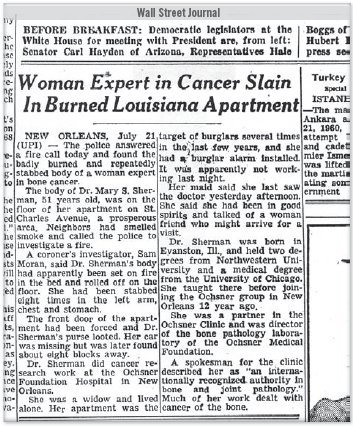
Lee’s most important achievement — temporarily saving Kennedy’s life — was an accomplishment he only hinted at, typically understating what he had done.5 I knew that Dr. Mary Sherman had given him the names of some trusted contacts, and that one of his warnings to save Kennedy had been successful. But I had no more information. I knew that Dr. Sherman’s contacts were in Chicago, but I didn’t know how that linked to Lee’s successful warning until James Douglass kindly sent me his book, JFK and the Unspeakable — Why He Died and Why It Matters. Only then did I realize how important Dr. Sherman’s role had been in the attempt to save Kennedy. I knew she must have been frustrated by our failed get-Castro project, which she had hoped would save the President’s life. I now understood that Dr. Sherman had continued to work with Lee. Nor had she cut me completely off: she had promised to give me a recommendation to a medical school in the Americas. But I did not realize that Dr. Sherman’s role — assisting Lee — had extended beyond New Orleans, back to her familiar territory in Chicago.
I now understood what courage Dr. Mary had. On July 21, 1964, only a few hours before the Warren Commission met in New Orleans to hear witness testimonies, she was brutally murdered.
Sunday, November 17, 1963
Just before Lee hung up, he uttered one of the normal-sounding sentences we used to indicate when he would call again, on our call wheel. “I’ll call back in a few days,” actually meant the same night and the same phone, but three hours later in our code system. To miss a call “broke” the wheel, meaning I’d have to wait for my time to call him. Because we took risks to be at the phone when it was the proper time and day, and because Lee had never before failed to follow through, I became frightened.
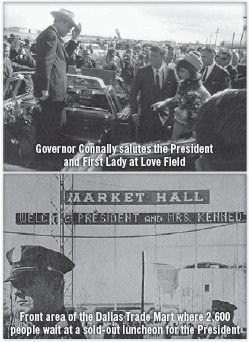
As I waited, risking Robert’s imminent return home from the university library, I reviewed how Lee had told me, in the flat tone of an undertaker, that Kennedy would be killed in one of three possible places: Love Field, the Trade Mart, or Dealey Plaza. Each site had its problems: Love Field was without good natural cover, making escape difficult for the perpetrators, but the large crowd expected there would provide some cover.
The Trade Mart had good sniper positions available inside and out, but it would be so heavily guarded that, again, escape would be difficult. That left Dealey Plaza, where several tall buildings surrounded what was essentially a fishbowl. However, the Dallas Police headquarters were located there. Unless the police were also involved, the mob of police certain to be present there to help guard the President should be able to home in on the snipers and catch them quickly, unless the snipers shot from the overpass, or from the low hill near the end of the Plaza. Because I knew Lee would move heaven and earth to call me if he could, I was now terrified. What if somebody had overheard? What if they’d killed him?
The call wheel was now disrupted, and Dave, who called me about once a week, wasn’t slated to contact me again until Friday evening. I would have to use the emergency numbers Lee had given me to reach him at the Texas School Book Depository (TSBD). It would be a per son-to-person call, using the code word “janitor” — and Lee would refuse the call. This got the call wheel on track again, for the time that I called automatically told Lee where and when I would be available for his call back, that same day.
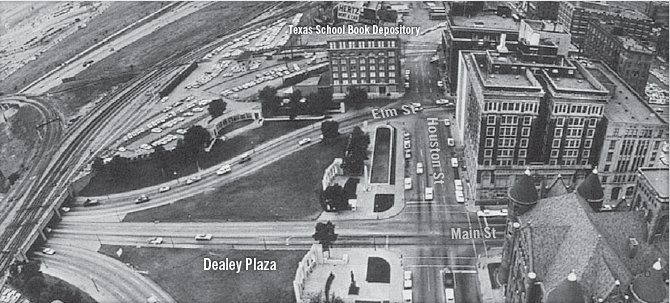
Wednesday, November 20, 1963,
The call wheel was like a clock that controlled our secure communications, but waiting for my turn seemed to make time stand still. Finally, during my afternoon break at PenChem, on Wednesday afternoon, I was able to call the TSBD, person-to-person, asking if Lee Oswald, the ‘new janitor’ was available to take the call. I hoped he would come to the phone, but I knew he got my message when the call was refused by Mr. Oswald.6
That night, Robert picked me up late from PenChem, where I worked overtime on Wednesdays and Fridays. He dropped me off at our cottage, and then, as he’d been doing all week, went back to the University library to study (or whatever!). I knew he wouldn’t return until at least 3:00 A.M.7
I waited a dark and anxious hour near the pay phone by the 7-11 store, and at 11:00 P.M., Dallas time, Lee called, apologizing for not calling me back on Sunday. He’d never had enough privacy to do so. For the next hour and a half, we talked our hearts out. It was the most ominous and sorrowful call I’ve ever experienced. “How much can you say?” I asked, worried that he might have to suddenly hang up again. “We’re safe,” he said, “but I have meetings tonight, in two different places.”8
Lee said that he was no longer alone, and an abort team had been called in to help him. “Even though they’re going to try to kill him,” he said, “I’ve sent out information that might be able to save him.”
In his Scarlet Pimpernel voice, he added, as if it was all just another adventure, “That’s worth dying for, you know!” I could close my eyes and imagine him smiling at me as he said that, full of bravado. But he meant it. This was the moment he had lived for. The chance to make a real difference with his life. But it was not a death wish. Informed that he was now ‘part of the group’ that would assemble in Dallas to shoot the President, and secretly the member of an abort team that would try to intervene, Lee said he would be required to obey orders from both sides.9
There was no way he could provide an excuse, he said, for not showing up where he was supposed to be. He was in too deep.
“Why don’t you make yourself sick, by taking a laxative or something?” I suggested, as if escaping the plot to murder the President would be like playing hooky from school! We had a grim laugh over the absurdity of that one. “Juduffki!” he said, then “Minnie-Mouse!”
Hearing those pet names he loved to call me, I wanted to die with him.
“I want to come!” I begged. “I want to be there — with you!”
“No!” he replied. “You’ll have to wait for a call from Dave.”
“I want you to call me!” I told him. “I don’t trust anybody anymore. And from all you’re saying, it’s too late to help Kennedy any more than you have. So just go!” I urged him.
“Even if I wanted to, which I do not,” Lee said, his voice trembling, “I couldn’t. We’ve talked about this before, Juduff. They’d not only do me in, they’d come after my family. They’d find you. You’d all die...”
What could I say? Lee was up against ruthless professional killers who followed the code of vendetta. If they were prepared to kill the President of the United States, anyone who got in their way would die, and if they couldn’t kill Lee, they’d kill everyone he cared about.
Because time was so short now, Lee said there wouldn’t be another call from him unless he reached Laredo.
“Lee,” I said slowly, “you didn’t say ‘until.’ You said ‘unless.’” “I apologize,” he answered. I heard him suck up his breath. We were both very close to tears. Then he asked if my packed suitcase was still ready, under the bed. He reminded me of all the wonderful places and things we wanted to see, and had dreamed about.
“You’ll get on the plane,” Lee said. “I’ll make sure you’ll be okay... “I’ll be there, if... ” We both feared the end of his sentence and froze in silence. “... if I don’t make it out,” he finished, solemnly, “Then you’ll have to go on ... without me.”
“How?” I asked. “Who could ever replace you, in my heart?”
“You love babies,” he said. “Promise me that you’ll have babies.”
“I don’t want to have babies with anyone but you,” I protested.
“Oh yes, you will,” he answered. “You take home baby birds and feed them. So I know you’ll want to have your own babies. Promise me.”
I knew in my heart that he was right, so I promised.
“I’ll never forget you, as long as you live!” I blurted out. “That might only be until tomorrow,” he said, with a tense laugh, as I realized that I had meant to say “as long as I live,” but my emotions were overwhelming me and my speech was getting sloppy. “How much more can you tell me?” I asked. “Who are you up against?”
“I’ll be talking to them tonight,” he repeated. “Then I’ll go to bed and miss you.”
“And tomorrow?”
“Tomorrow, I’ll go say goodbye to Junie, and Rachel, and Marina...” Lee took a gasp of air, as if he struggled to breathe. Warm tears started streaming down my cheeks again. Soon we were both crying. I wanted to hold him, but the only thing I could do was squeeze the phone tighter.
“Oh, my God! Lee!” I blurted out. I felt weak, helpless. I leaned against the pay phone with the midnight of the world spinning around me. I suddenly felt like Lee and I were standing at the flaming gates of Hell itself.
“Know how we wondered who my handler was?” Lee whispered. “Mr. B? Benson, Benton, or Bishop? Well, he’s from Fort Worth, so it has to be Phillips. He is the traitor. Phillips is behind this. I need you to remember that name,” Lee said, repeating it with cold anger. “David Atlee Phillips.”
David Atlee Phillips

David Atlee Phillips was a CIA officer working in Mexico City in 1963, at the time of Lee Oswald’s visit. On Nov. 20, 1963, Lee Oswald also told Judyth Vary Baker that he believed that David Atlee Phillips was coordinating the JFK assassination plot.
Born in 1922 in Fort Worth, Texas, Phillips fought in World War II as a nose gunner on a bomber and was captured, and became a prisoner of war in Germany. After the war, he moved to Chile and started an English language newspaper for South America. In 1950 he started working for the CIA and rose through the ranks, eventually becoming Chief of Operations for the Western Hemisphere.
In 1954 Phillips was instrumental in over-throwing the freely-elected president of Guatemala, Jacobo Arbenz, after he nationalized land owned by the United Fruit company. Phillips orchestrated a combination of propaganda and bribery, as well as financing of a rebel army which invaded Guatemalan from Honduras. In 1959 Phillips went to Cuba to work undercover after Castro took over. In 1960, he returned to the United States, helped to organize the Bay of Pigs invasion, and worked on a means of having Fidel Castro murdered. CIA’s Richard Helms appointed Phillips as Chief of Cuban Operations, enabling him to roam the entire Western Hemisphere freely to coordinate secret operations to get rid of Fidel Castro. To this end, Phillips is said to have used the name “Maurice Bishop” while working with an organization of anti-Castro Cubans called Alpha 66.
In 1963 the CIA station head in Mexico called Phillips “the most outstanding Covert Action officer that this rating officer has ever worked with.”

Phillips later served as CIA Station Chief in the Dominican Republic and in Rio de Janeiro. In 1970, he was called to Washington to lead a task force to prevent the election of a leftist President in Chile. The effort failed and Salvador Allende was elected President of Chile, only to be killed in a military coup in 1973. In 1975, Phillips retired with honors from the CIA.
Over the years a number of researchers have suggested that Phillips was involved in planning the JFK assassination. In 2007 a deathbed statement from former CIA officer E. Howard Hunt, who had worked with Phillips in Guatemala and in anti-Castro operations, named Phillips as a participant in the JFK assassination.
Lee then said there were two other names I needed to remember: Bobby Baker and Billy Sol Estes. He said the assassination itself was not their doing, but it was because of them, and I was never to forget their names.
My thoughts were racing every direction at once, as I frantically sought a solution. “Is there any way you could get out of this? Something you haven’t thought of?”
“They’d just get another gun to take my place,” Lee said. “If I stay, that will be one less bullet aimed at Kennedy.”
Bobby Baker

Robert Gene Baker was a powerful Washington insider and advisor to Lyndon B. Johnson, as his 1978 book, Wheeling and Dealing: Confessions of a Capitol Hill Operator, details. At the height of his political power as a Senate deal-broker he was often referred to as the “101st Senator”.
Starting as a page in the U.S. Senate at the age of 14, he was befriended by Senator Lyndon B. Johnson and participated in LBJ’s deal-making so much that he was known as “Little Lyndon.” Baker obtained political information for LBJ who said: “He seemed to sense each man’s individual price and the commodity he preferred as coin.” Baker eventually became secretary to the Senate Majority Leader. In the early 1950s Baker began a series of shady business deals, such as arranging for a Mafia associate of Meyer Lansky and Sam Giancana to become involved in a deal to establish casinos in the Dominican Republic. In 1960 Johnson was elected Vice President under JFK, and Baker remained as Johnson’s secretary and political adviser.
In 1962 Baker had established the Serve-U-Corporation to provide vending machines for companies working on federally granted programs. The machines were manufactured by a company secretly owned by Chicago Mafia boss Sam Giancana and others. A lawsuit associated with this venture eventually generated so much press that an investigation was launched into Baker’s business and political activities. Rumors that Baker was involved in corrupt activities prompted Attorney General Robert Kennedy to investigate further, and he discovered Baker’s links to Clint Murchison and several Mafia bosses. In the process, evidence emerged that LBJ was tainted with political corruption involving a $7 billion contract for a Texas company to build fighter jets. Lawyer Abe Fortas represented both Lyndon B. Johnson and Bobby Baker and worked behind the scenes in an effort to keep this information from the public. (LBJ later appointed Abe Fortas to the U.S. Supreme Court.) On October, 7th 1963, Baker was forced to resign his post on the Senate staff.
News that the FBI had discovered that the Quorum Club, which Baker also ran, was providing women for liaisons to leading politicians expanded Baker’s legal problems. As a result, JFK decided to drop Lyndon B. Johnson as his running mate in the 1964 election.
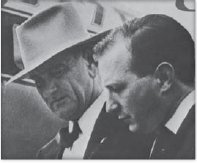
Joachim Joesten, an investigative journalist, wrote: “The Baker scandal then is truly the hidden key to the assassination, or more exact, the timing of the Baker affair crystallized the more or less vague plans to eliminate Kennedy which had already been in existence. The threat of complete exposure which faced Johnson in the Baker scandal provided that final impulse he was forced to give the go-ahead signal to the plotters who had long been waiting for the right opportunity.”
In 1967 Baker was found guilty of seven counts of theft, fraud and income tax evasions, including keeping “campaign donations” intended to buy influence with various senators for himself. He was sentenced to three years in federal prison, but served only sixteen months.
His words seared into my soul: “If I stay, that will be one less bullet aimed at Kennedy.” These were his exact words. They would stay with me forever.
“Maybe I can still do something,” he added, grasping at a straw, “but what bothers me the most is that they’re going to say I did it. They’re going to pin it on me. And what will my babies think of me, when they grow up?”
“I hate the human race!” I wailed. This corruption was evil itself. The unmasked face of human hatred.
“Stop it!” he commanded. “I can still do something. Maybe I can fire a warning shot.”
I was speechless. Did he really think that would work? Or was he just trying to make me feel better?
Billie Sol Estes
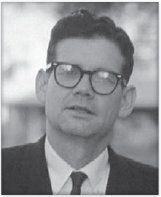
Billie Sol Estes was a Texas businessman best known for his involvement with a variety of scandals involving then Vice-President Lyndon B. Johnson. After amassing a fortune in various agricultural businesses in the 1950s, Sol Estes was arrested by the FBI in 1962 and charged with 57 counts of fraud which alleged he had swindled $24,000,000 from various sources using schemes that involved federal government programs for grain and cotton. The investigation lead to his relationship with LBJ, and other members of the Texas Democratic Party, and the charges had the potential of convicting LBJ of crimes that would not only destroy his political career, but put him in prison. President Kennedy was aware of these developments and is said to have privately decided to drop LBJ from his 1964 presidential ticket as a result.
As the investigation into Sol Estes activities continued, a total of seven witnesses suddenly died from carbon monoxide poisoning, though one was also shot five times. All were ruled as suicide. Sol Estes was defended by one of LBJ’s attorneys, and though he was found guilty and sentenced to fifteen years in prison, he spent little time there, since his conviction was overturned in 1965 by the U.S. Supreme Court, which said excessive media coverage had deprived him of a fair trial.

Later in life, after LBJ’s death, Estes admitted to secretly funneling millions of dollars to LBJ and that it was LBJ who had ordered the murder of President John F. Kennedy, Henry Marshall, George Krutilek, Harold Orr, Ike Rogers and his secretary, Coleman Wade, John Kinser, and even Josefa Johnson, the president’s own sister. Sol Estes had his attorney write a letter to the U.S. Department of Justice stating, “Mr. Estes is willing to testify that LBJ ordered these killings, and that he transmitted his orders through Cliff Carter to Malcolm Wallace, who executed the murders.”
It should be noted that it was Cliff Carter who called the Dallas Police Department from the White House and instructed them to bring Oswald outside for the television cameras on Sunday, Nov. 24, 1963, where Jack Ruby shot him. Further, Mac Wallace’s finger print was found on a box of books stacked in the so-called “sniper’s nest” on the 6th floor of the building where Lee Oswald worked on Nov. 22, 1963.
“The Secret Service will react,” Lee said. “The Chief might react. Even the driver.”
The thought of Lee firing a warning shot only to have the many guns of the President’s Secret Service team turned on him terrified me into silence.
After the pause, Lee said: “I’ll love you as long as my heart is still beating.” He told me that when he came to me, he would be wearing the brown shirt I had bought for him, and that he would not be wearing “that demmed wedding ring.”10
“Humans should live as long as oak trees!” I mourned, recalling a poem Lee had read to me about an oak and a lily.
“But lilies are beautiful, too,” he countered. “Besides, I’m no dummy. As you said, yourself, I still have some tricks up my sleeve.”
Then Lee asked me to pray for him. I said an “Our Father.”
When I was finished, he said “I’m satisfied. It’s a very old cry to God. Maybe He will hear it.”
“I love you, Lee,” I whispered, as I pressed myself against the pay phone, hoping to get inches closer to the man I loved, as he spoke the last words I would ever hear him say to me.
“Goodbye, Juduffki. I love you,” he said. Then he hung up the phone, and the silence began.
It was around 2:30 A.M. as I walked back home alone, oblivious to the darkness around me, worrying only about the dangers that Lee faced. The next day was full of worry, but void of any incident worth mentioning here. I went to work as usual and played wife for Robert at home.
Friday, November 22, 1963
I went to work at PenChem, as I’d done every day for the previous six weeks. I tried to act normal, though I knew this was no ordinary day. At lunch time, I sat down in the laboratory to eat. Cabinets and shelves lined the walls. Sleek stainless steel counters were stacked with sophisticated equipment and orderly rows of test tubes.
I had brought a diet shake to eat for lunch. I dipped my milky diet drink into one of the large Dewar jars that held gallons of sub-zero liquid gas and it froze in seconds, yielding a taste like ice cream. I ate it with a spoon.
For some reason, our hour-long lunch break started later than usual that day. Mr. Mays, my boss, and Nancy, his assistant, greeted several chemists who came into our lab area for lunch. They seated themselves on tall stools at counters to watch the news on a television set which hung from the wall near the door. It was rarely turned on at lunch time, but today it was. The noon news was on. Other employees came in, too. It was unusual to see so many people crowded into our small lab. I wondered why so many people came in to watch the television when there was a volleyball game in progress outside.
As for me, I held dreadful secrets in my heart, and every minute crept by with increasing anxiety. Would President Kennedy die today? Would Lee? I felt so helpless. I was nobody. There was no one I could call. The only real information I had was the name of a CIA officer that Lee said was involved. The CIA killed heads of state, so what would they do to Lee and me if we got in their way? There was an ‘abort team’ out there. Perhaps Kennedy was already safe — perhaps the assassins had been located and arrested! After all, Lee had sent information and warnings. As the news program concluded, I could hear several men in the lab whispering tensely about Kennedy. One expressed his hope that somebody in Dallas would shoot him. I kept my mouth shut, feeling so paranoid and suspicious that I wondered if some of the people in the lab could be in on the plot.
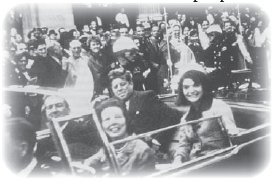
When I finished eating, I started to work on logbooks, occasionally glancing over at the TV which had played clips of JFK and Jackie and Air Force One on the mid-day news. The leading chemists and technicians were still unaccountably sitting in our lab, discussing Kennedy. I heard somebody tell my boss that the president had arrived in Dallas and that his motorcade was currently parading through the city.”11
I reminded myself how important it was to show no interest or emotions, and to maintain my veneer of calm, but inside I was on fire. President Kennedy may have been the most charismatic leader in America, but in the Deep South, he was hated by the segregationists and anti-Catholics. Stories circulated about the president being soft on Communism and “a puppet of the Pope.” Almost everyone I worked with at PenChem showed open disdain and even hatred for the “Yankee President.”
As the minutes ticked by I gazed out the window, where the volleyball game was still in progress under some pine trees. I reviewed the lab schedule for the afternoon: optical analysis of a few test compounds with a ruby laser and an alkaline-halide crystal. By now, I could do that work with my eyes shut. A half-dozen scientists and technicians still congregated in the lab, chatting and listening. What kept them here, near the TV set? Did they know something about the plans in Dallas? After all, my job at this facility had been arranged by people like Dave Ferrie and Dr. Ochsner. Was there a connection?
Shortly after 1:30 P.M. Florida time (12:30 P.M. Dallas time), the television erupted with an announcement that the President had been seriously wounded by gunfire in Dallas. Soon, the network cut away from its regular programming. I can’t remember the words; I only remember my horror. About a half-hour later, we heard news that a priest had given last rites. This news was greeted with cheers and whistles of approval in the lab. Tears started running down my cheeks, despite my efforts to hide them
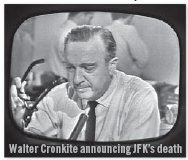
“Good!” Mr. Mays said, slapping his big hand against his thigh.
“For God’s sake!” I exploded, “This man is fighting for his life! What’s the matter with you?!”
Seeing the expressions on the faces around me, I realized the terrible political error I had just made. I’d forgotten where I was, and who I was supposed to be. This was Florida! And I was a lab assistant.
I shrank under the malevolent glares, wiped my tears, and lowered my head. I had not only exposed myself as a Kennedy sympathizer; I could have jeopardized those who had sent me here. The poisonous whispers and sidelong glances at me continued, so I went to the sink and washed my face, put my lab coat up on a hook, and fell into a seat at the records desk so I could face away from the others.
After awhile, it was announced that President Kennedy was dead. I started crying quietly again as I opened the logbook, and tried to look busy. Maybe Lee had not been caught in the middle of this mess. As I wiped my eyes, I noticed my hands were shaking. OK, Kennedy was dead, but could Lee make it out of Dallas alive? Would he be found dead in the Depository with a rifle lying near his body? I preferred to hope that Lee was heading toward a small plane waiting for him at some small airport. At least, no arrests had been announced. No news was good news for the moment.
It was now about 1:50 PM in Dallas. My imagination ran wild.12 In another half-hour, Lee could be in the air, headed for Houston. Dave had even promised to fly Lee to Laredo. Soon after, I could meet him in Mexico. We’d have our marriages annulled, change our names, and hide until it was safe to emerge again.
The television interrupted my daydream. A man hiding in the Texas Movie Theater had been arrested for killing a Dallas police officer.13 The officer, J.D. Tippit, had been shot in Oak Cliff. Hearing this chilled me to the bone, since I knew Lee’s apartment was in Oak Cliff.
Soon, the media’s speculation began. Could this man also be the President’s assassin? My hopes began to dim, remembering how Lee had said he went to tell his family goodbye on Thursday evening.
Then I heard the words I feared: “Lee Harvey Oswald.” I flashed on Lee’s comments from only 38 hours ago, telling me they were going to blame it on him.
By 4:00 P.M., the TV and radio had begun repeating the name “Lee Harvey Oswald” over and over. I shuddered, realizing he was being set up as the scapegoat, just as Lee had predicted. Everyone in the lab was glued to the tube.
I also noticed that the news announcers constantly used Lee’s middle name, like it was a mantra. What was Walter Cronkite’s middle name? Why did they have to say “Lee Harvey Oswald” with the same solemnity as when they identified President Lincoln’s assassin as “John Wilkes Booth.” It had the sound of finality about it. As if they were pronouncing a death sentence, writing an obituary, or engraving a tombstone.
Suddenly I began to worry about my own safety. What if the local police or federal agents burst into the lab and hauled me away? What could I say? Who would believe our government was being taken over from the inside? While Dave, Lee and others had done everything they could to eradicate all traces of my involvement, we knew we were fighting forces much bigger than ourselves. I whispered to myself: Remember where you are. Stay calm. You have to survive.

Finally, I saw Lee’s picture flash on the screen. I could see he had been beaten. I gasped.
Mr. Mays noticed. “Are you a Goddamned Communist?” he shouted at me. His assistant, Nancy, looked at me like I was mad. It was puzzling to them. First I cried because President Kennedy was killed, and now I was upset because they had “caught the man who shot him.” But I had lost more than they could understand. Yes, in that moment, I had lost their esteem, my job, and my future with them, but more importantly to me, I had lost hope for Lee. As long as he lived, he could talk. But those who knew what Lee knew would not want him to talk. Lee was a dead man walking. At least he had not been shot on the street or during his arrest. Perhaps police custody would provide him some shield against those who wanted to silence him. The lab looked like a dreamscape to me. I pretended to work and hoped the day would end soon.
About 5:00 P.M., my colleagues began getting into their cars to go home. I had no car, so I had to call Robert for a ride. There was a pay phone outside by the compressed gas tanks. I reached it and called Robert, who was at home studying. I told him President Kennedy had been killed. As usual, he had few words to say: “That’s bad news. What a shame. It’s because he was for integration, you know.” I told Robert the lab was closing down, and everybody was going home.14 I asked him to come pick me up. But Robert, always practical, reminded me that if I worked an extra hour or two, as I usually did, then we wouldn’t lose money today.
“I just want to go home,” I told him sadly. I had no strength to work and no desire to fight. Robert, however, did. He argued with me, telling me that I wouldn’t feel any better at the house than I did there. I began to feel resentful again towards Robert. Why wasn’t he bothered by the shocking news that the president had been murdered?
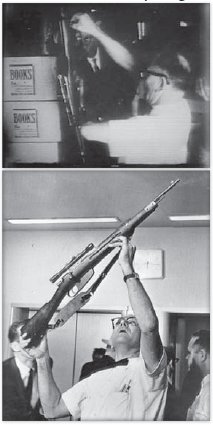
With no way to get home by myself, I sat in the lab and watched the relentless news as it unrolled across the screen. By now, it seemed everyone had jumped to the conclusion that Lee killed Kennedy. The images of the next two days flash in my memory, as they do in millions of others. The police paraded a rifle for all to see, announced that Lee had lived in Russia, and reported on his pro-Castro activities. I was appalled when I heard them refer to him as “the assassin,” instead of “the accused assassin.” What happened to “innocent until proven guilty?” Why was the media presuming Lee was guilty from the start? I knew Lee didn’t kill JFK. Lee thought Kennedy was our best hope for peace. But what about Officer Tippit? While I couldn’t imagine Lee actually shooting anybody, maybe Tippit had tried to shoot him, and Lee had to defend himself. Such is the weight of an accusation.
Suddenly, I remembered the call wheel. I always worked overtime on Fridays. If I’d gone home, I would have missed Dave’s call! I checked the call-wheel schedule. It was time for Dave to call! I headed to the pay phone under the pine trees near the gas tanks. Surely he would have some inside news. The phone rang right on time, but as soon as I answered, Dave exploded: “Do you have my library card?” he demanded. “Jackass Martin called the police and told them Hector had my library card!”
Then it struck me. Dave wasn’t talking about his card for the New Orleans Public Library; he was talking about his card from the Tulane Medical School library. That card would lead the police not only to Dave Ferrie, but straight to Dr. Ochsner. The Project would be exposed, and that would be disastrous for everybody involved!
Dave had lent me his TMS library card so I could check out medical journals, and I had given the card to Lee in David Lewis’s presence when I needed Lee to return some medical journals for me. David Lewis must have told Jack Martin, as he always seemed to do, especially with information concerning Dave Ferrie. Lee, of course, had given the card back to me later, but David Lewis (and therefore Jack Martin) didn’t know that. I had planned to give the card back to Dave Ferrie the last time I saw him, but that was the same night that I had the disastrous exit interview with Ochsner. I was too upset to remember Dave’s TMS library card. It had remained lost and forgotten somewhere in the cellars of my cavernous purse.
“Do you have it?” Dave demanded frantically. “I’ve even been to Hector’s apartment, and it wasn’t there!”
“I have it,” I replied.
“I want you to burn it! Right now! While I’m on the phone!” Dave ordered.
Here I was, standing in between a liquid nitrogen tank and a liquid oxygen tank, with “No Smoking” signs posted all around. I described the scene to Dave over the phone.
“Then dissolve it in sulfuric acid!” he commanded. I agreed to do just that, though I actually ripped it into tiny pieces and buried it in the sand under a pine tree.
“Thanks, J,” Dave said, sounding a bit more relieved. “I’m okay now. I’ll deny knowing anything about the card. I’m going over there (to Texas). The boys will be driving all the way. The good news is, we talked to Marcello’s people at supper, and Lee’s going to get some high-powered legal help.”

Dave had spent the afternoon in court with Carlos Marcello. It was the conclusion of a long trial. Bobby Kennedy’s people had tried to deport him, but they failed. At almost the same moment, they heard that JFK had died. Marcello was having a party for his victory over Bobby Kennedy, and as part of Marcello’s inner team, Dave was required to attend.15
“We’ll get Lee sprung,” Dave exclaimed.
“Sprung?” I could hardly believe my ears.
“He’s not the only one who got arrested,” Dave said. “He’s just getting all the publicity right now. You have no concept of how powerful the mob is in Dallas. Marcello’s lawyers are on top of it right now. I give you my oath on a stack of Bibles. We’ll get him out, or somebody will pay, big time.”
I was used to Dave’s hyperbole, but I did allow my hopes to rise a bit.16
Dave said he’d call back tomorrow when he knew more. It would be to a different phone and very late. Meanwhile, he suggested that I pray to St. Jude.
Saturday, November 23, 1963
The wait for Dave’s phone call seemed like forever. Fortunately, Robert had fallen asleep watching the news with our friends the Zieglers, but we were young and kept late hours, so they were still up. We occasionally spent a long night with the Zieglers, and they were used to my going outside at night to take a look at the positions of the planets or to get soft drinks, so when I said I wanted to get some fresh air, they gave me some money to retrieve cokes from a vending machine down the street. As I walked to the pay phone, I was on edge and my hair raised at every sound in the dark night. I hoped my watch was in synch with Dave’s, so I wouldn’t have to wait around for his call.
The phone rang as soon as I reached it. Dave was as nervous as I was and apologized for calling a few minutes early. I told him I was glad he did. Then I heard Dave make a sound as if he were choking. I realized he was swallowing back his tears. “Oh, my God, J,” he said to me. “I won’t hide it from you.”
Dave was crying. I started to cry, too. I didn’t think I had any tears left, but there they were, stinging my eyes. I was so anxious to hear what he had to say.

“It’s hopeless. If you want to stay alive,” Dave warned me, with a strained voice, “it’s time to go into the catacombs.17 Promise me you will keep your mouth shut!” he added. “I don’t want to lose you, too,” he said, his voice choking on his words. I felt weak all over. “If there is any chance to save him, we’ll get him out of there, I swear to you. So play the dumb broad, and save yourself. Remember, Mr. T will watch every step you make.”
Dave meant I was being watched by “Santos” Trafficante, the Godfather of Tampa and Miami. He was also the good friend and ally of Carlos Marcello. Fortunately, Marcello liked me, which is why I believed I had a chance to survive any threats from that direction.

“I’ll call you one more time. After that, I can’t call anymore,” Dave said. “And now I have other calls to make. So, Vale, Soror.”18 (“Be strong, sister.”)
I returned to the Zieglers’ house with four soft drinks from the coke machine. Nobody had moved from the TV set.
Sunday, November 24, 1963
I was still freaked out. The stress was unbelievable, and I couldn’t sleep. Robert was surprised that I couldn’t even cook. “I had no idea you liked Kennedy so much,” he said. Luckily, all of America was transfixed by the tragedy, and everyone was watching their televisions, so the Zieglers were no exception, and I was welcome as always.

As lunchtime approached, we were watching the non-stop television coverage of the JFK assassination. Robert had left for the university library to finish an English paper. We all knew Lee was to be transferred from the city jail to another location, since it was announced the night before. I was, of course, anxious for more information about Lee, and watched attentively. But there was delay after delay, and we were subjected to continuous replays of the interviews and endless discussions of the President’s upcoming funeral. In this mix, there were also brief clips of Lee saying “I didn’t kill anybody ... I haven’t shot anybody” and “I do request someone to come forward to give me legal representation.”
The transfer was dangerous. I was afraid, because I had heard how corrupt the Dallas police were. I also knew that there was real anger out there over the murder of the president, and much of it was being directed at Lee. So I was afraid of those who might want to take revenge on Lee. I didn’t dare leave the set, or rest my eyes, though I hadn’t had a bit of sleep. My heart ached as I realized that millions of people were seeing a face they recognized only as the killer of a beloved president.

Now the time had come for Lee’s transfer to a place out of the public eye, where I feared that he would be tortured to force a confession. But I knew Lee would never confess to such a thing. I watched with immense concern and tried to stay awake. Then I saw Lee come out!
At first I was relieved that they had given him a sweater to wear. Then I realized Lee was now dressed all in black, like a villain or a hit man. How crowded the place was!19 It was practically a mob scene. My eyes searched to see Lee. You could hear the excitement rippling through the crowd in the basement. There was a throng of reporters. Now I could see Lee, handcuffed and flanked by two giant Texas marshals hanging onto his arms. His face showed the strain of hours of interrogation.

A horn honked, as a vehicle suddenly moved into place, distracting everyone’s attention for a split second. I held my breath as Lee was brought forward through a throng of shouting reporters, as cameras flashed. Lee glanced briefly to his left as if he saw someone he recognized. Suddenly, a dark, hulking figure lunged from the direction Lee was looking and threw himself against Lee. A gunshot was heard.20 I saw a bit of Lee’s face, twisting with pain as he gasped, and then collapsed, buried under a pile of thrashing people. The basement exploded into chaos. There were shouts, and pandemonium broke out as police and reporters rushed forward. I screamed. It was the most terrible moment of my life. I can’t remember a thing after that, except vomiting in the bathroom. Then everything blanked out. I can’t recall how I conducted myself. I remained that way for hours, if not days. I recall only a deep and relentless presence of anger and outrage that kept me on my feet when I went to work the next day, despite my overwhelming grief.

No, Lee did not confess during his long hours of interrogations, nor as he drew his last pain-wracked breaths.21 To his last gasp, Lee insisted that he shot nobody. He was taken to Parkland Hospital where President Kennedy had died.22 He was even wheeled into the same emergency treatment room, but objections arose, and a precious minute was lost, moving him to a different room.

Lee was cut wide open without any anesthesia. His lung, liver, aorta, kidney, spleen, and a blood vessel to the lung had been cut by the single bullet, which didn’t quite exit his back. After 45 minutes of traumatic physiological stress, his blood-deprived and overburdened heart finally faltered, and stopped beating. The man I loved more than anyone in this world was dead, and I would never see him again. Never hear him again. Never touch him again. Never have his babies. Never look into his blue-gray eyes again. They had taken my true love away from me, in front of the whole world. And they did it in a police station, where law and order should prevail. The perverse irony of it all was only overshadowed by my anguish. It was the worst day of my life.

The shooting of President John F. Kennedy
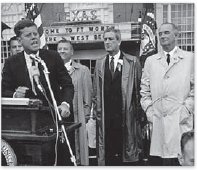
On November 22, 1963, at 12:30 PM local time, President Kennedy was fatally wounded while traversing Dealey Plaza in Dallas Texas in an official motorcade. Kennedy had come to Texas in hopes of increasing his popularity in anticipation of the 1964 presidential election.

The President spoke early that Friday morning in Fort Worth, then flew to Love Field near Dallas by mid-morning. His motorcade then drove through downtown Dallas on his way to the International Trade Mart where he was scheduled to speak at a business luncheon. The protective bubble-top had been removed from the limousine for the day, and the weather was clear.

As the motorcade moved down Main Street, the crowd gave JFK an enthusiastic welcome. Texas Governor John Connally and his wife rode in the limousine with President and Mrs. Kennedy. The parade was to end at Dealey Plaza, a historic park edged on one side with courthouses and police stations.
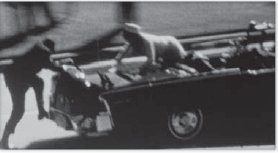
After passing the Dallas Sheriff’s Office, the motorcade then turned right on Houston Street, went one block, passing the county jail, and then turned left on Elm Street, making a 130 degree turn which slowed the Presidential limousine down to 11 mph as it passed in front of the Texas School Book Depository (TSBD). Proceeding past the TSBD down Elm Street, several gunshots were heard. Both President Kennedy and Governor Connally were hit by bullets, but Mrs. Kennedy, Mrs. Connally and the two Secret Service agents in the front seat were not. How many shots were fired, by whom, and from which direction, and from what type of weapons, has long been the center of much of the JFK assassination debate.
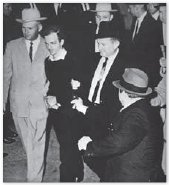
Kennedy and Connally were rushed to nearby Parkland Hospital where Kennedy was pronounced dead at 1:00 pm of a gunshot wound to the head. Governor Connally, who had serious wounds to his chest, survived.
Within the next hour, a Dallas police officer was gunned down in Oak Cliff, a residential neighborhood a few miles from downtown Dallas. Police arrested a 24-year old Lee Harvey Oswald in a nearby movie theater for the policeman’s murder (although evidence has since surfaced indicating that Oswald was in the theater during the Tippit shooting). Later that afternoon, it was announced that Oswald worked in the Texas School Book Depository Building and had been in the building when Kennedy was shot, and that he was being charged with murdering both the President and the police officer.
Two days later, Lee Oswald was murdered in the basement of the Dallas Police Station by a local nightclub owner and Mafia bagman named Jack Ruby. The President’s murder was recorded by numerous spectators’ movie and still cameras, and Oswald’s murder was broadcast live on national television.
__________________________
1. Lee did not give me a numerical address where these dignitaries lived: I looked it up years later.
2. The route scheduled to be driven was as follows: left turn from the south end of Love Field to West Mockingbird Lane, right on Lemmon Ave, and just after passing Lee Parkway (ironic name), make a right turn at the Robert E. Lee Park, onto Turtle Creek Blvd. From 3525 Turtle Creek Blvd., you could view the motorcade as it turned onto Turtle Creek Blvd. The motorcade then proceeded down Turtle Creek, which turned into Cedar Springs Road, then turned left on North Harwood Street, turned right on Main Street, turned right on Houston Street, then made the deadly, sharp left on Elm Street, and through the Triple Underpass. The rest of the route would have included a right turn up the ramp to North Stemmons Freeway, to the Dallas Trade Mart at 2100 North Stemmons.
3. Douglas Horne’s five books. Inside the ARRB, James Douglass’ book, JFK and the Unspeakable: Why He Died and Why It Matters, and Vince Palamara’s fine research all point to Secret Service involvement in the plot to kill JFK.
4. Marina Oswald Porter, April 19, 1996, letter to Mr. John Tunheim, Chairman, JFK Assassination Records Review Board, 600 E Street NW, Second Floor, Washington, D.C. 20530, (Certified Mail No. P 271 942 632)
5. Ref: Douglass, James: JFK and the Unspeakable: Why He Died and Why It Matters, p. 200-201, 213-217, as reported by Abraham Bolden and his wife, and corroborated by official records.
6. I estimate I made the call to the TSBD at about 1:00 PM Lee’s time, knowing he always showed up after lunchtime to check his schedule. Our calls on the Mafia racing line went through the Covington exchange, near New Orleans, as arranged by Dave Ferrie for us, and previously, the operator sending on the call was never a problem. But this time, the operator gave me some trouble. She would later tell investigators that a woman with ‘no accent’ asked for “Lee Oswald” the ‘new janitor’ (the middle name ‘Harvey’ was added to the document after it was typed) at the TSBD and that Oswald did not accept the call.
7. I found records that I attended night classes on Tuesdays and Thursdays at this time, but because of the trauma of what happened, I withdrew before the end of the trimester. I own a document showing that I withdrew for ‘health reasons,’ which was certainly the case: for almost two weeks, after the horrible events of November 22-24, for the first and last time in my life, I considered suicide.
8. Any mention of “meetings” made by Hector (Lee) while on the phone meant telephone calls, not physical meetings. I therefore assume Lee would still have to make two more phone calls before he could get to bed, or we would probably have talked for at least another hour. Anyone who is close enough to me to have endured my phone calls knows they can last for hours. But in our final call, we could no longer follow the rules or easily control our emotions. I called Lee by his real name, and he tenderly called me all sorts of silly pet names.
9. I was not in Dallas on the 22nd, so I can only speculate how Lee ended up in the TSBD — his own workplace — that fateful day at lunchtime. Employees had a 45-minute lunch break, and Lee usually ate alone, then went for a walk outside the building. He did not go for a walk on November 22. I wonder if Lee was ordered to stay inside his own workplace, which I think would have proven to him that he was going be set up to take the blame, just as he suspected. He was supposed to have a ‘spotter’ with him, who instead of helping him would likely kill him if he didn’t cooperate. It seems that Lee was left to himself in the TSBD. His handlers may have hoped he would panic, or otherwise seem to be involved, and then could be shot on the spot. By being ordered to stay inside the TSBD, he would also have no way to contact the abort team. A close examination of the events that day reveal that Lee Oswald was not expected to survive arrest. But they were dealing with an intelligent man who knew how to stay calm in the throes of a hurricane.
10. What he did wear was his U.S. Marine Corps ring, with its motto “semper fi”— always faithful. Imagine how I felt, seeing that reddish-brown shirt on him, in pictures I saw many years later. All photos I’d seen were black and white on the 22nd, showing a ripped-open shirt. For 36 years, I wouldn’t look at even the smallest newspaper article about any of it. Then, in late 1999, I finally gritted my teeth and looked at the pictures. Oh, so many lies about Lee! So many words, and so little understanding.
11. I knew that Jackie was wearing a pink suit and had been given red roses. For years, I thought I had seen the Kennedys arrive at Love Field on TV, remembering her pink suit and the fact that the red roses would look nice with it, but the Love Field arrival clip was played over and over that weekend. I recall that transistor radios were all over PenChem, and some radio stations made news broadcasts every half hour. That’s probably when we heard the comments on Jackie in her pink suit in Kennedy’s motorcade that was ‘now’ going through Dallas.
12. Lee would leave that plane at the airfield at Alief, Texas, and travel to nearby Hull Field, where Dave Ferrie, or a trusted associate, would arrive six to twelve hours later from New Orleans, by car or plane depending on the weather. A storm was plowing across southern Louisiana and the Gulf Coast, but Dave would fly if able; he was willing to take some risks.
13. The Texas Theater was owned by Howard Hughes, who had strong ties with the CIA. The fact that Lee moved around, seating himself next to several people, including a pregnant woman, within a few minutes suggests he was trying to find a contact. Whoever sent him to the theater betrayed him. A witness reported seeing an “Oswald double” leave the back door of the theater, and enter a police car. For years he thought Oswald was arrested and taken out through the back door of the theater until he was told that Oswald was escorted out the front door.
14. PenChem only ‘closed down’ totally for Christmas and the 4th of July. But very little was getting done today, and by volunteering to finish experiments for others so they could go home at 5:00, I could add an extra hour or two to my work load. I worked overtime three times a week, and had earned keys to both open up and close down my lab, including keys to the compound’s gate itself, for everything was fenced in for security reasons. I was also allowed to create some special chemicals which eventually, by roundabout means, reached New Orleans.
15. Dave also told me that Marcello had rigged not only the jury, but also fixed the date of the last court session so he could celebrate JFK’s, death as well as his victory, “to rub it all in Bobby’s face.” Marcello was certain Kennedy would die that day. With the use of the mafia by the CIA, and with Lee’s seemingly strong links to Castro, the government’s role in the coup was well hidden, except for the actions of the Secret Service and the Dallas police. Only later would the FBI’s complicity become obvious.
16. Dean Andrews would later admit he’d received a call to help Lee, then retracted his statement after Garrison went for the jugular.
17. This was one of Dave’s religious references to the early days of Christianity when the Christians hid and buried their dead in vaults underground.
18. The Latin word “vaIe” is a farewelI, Iike “take care” or “be strong .” “Soror” means sister and is the root word in “so rority.”
19. I learned that seventy of Dallas’ finest — plus uncounted reporters — were present, yet not one man was placed in front of Lee to protect him from a frontal attack, and neither man “guarding” Lee had a firearm ready.
20. The blast sounded muffled like a silencer. The shot was fired so close to Lee that his body muffled the sound of the gunfire.
21. President Johnson called the Parkland emergency room and requested that they get a death bed confession out of Lee.
22. While waiting for an ambulance, Lee was carried, still handcuffed, into a small room where we only have the police version of what happened. They said they urged him to make a deathbed confession, but he shook his head and remained silent. The receipt below shows that Lee Oswald, though mortally wounded, received no oxygen in the ambulance — an unconscionable omission.
